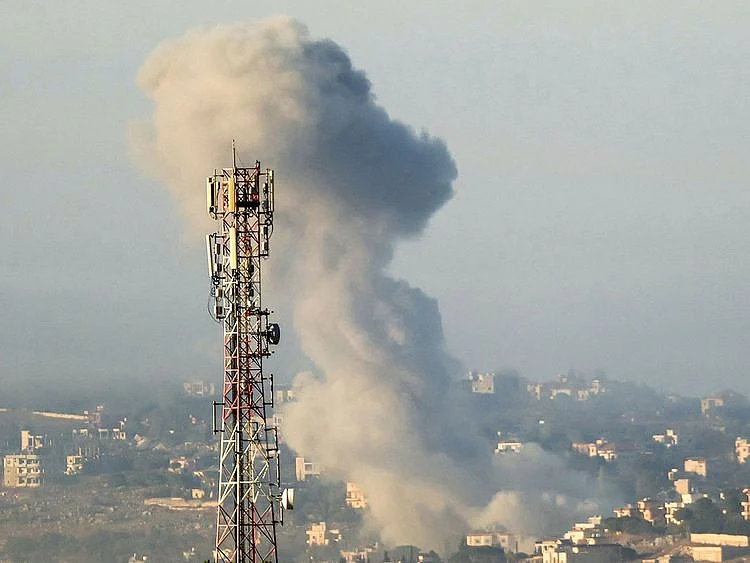How wars fuel the global climate collapse
Mitigating the effects of global warming requires compassion, not combat across borders

“War is only a cowardly escape from the problems of peace,” Thomas Mann once stated.
It is also a major cause of suffering for millions of people globally, as it not only kills those directly exposed to it but also future generations who inherit its consequences. While the humanitarian aspect of war draws global attention, its significant impact on the environment is missed.
Reports indicate that about 5.5 per cent of global carbon emissions are due to wars, which damage the environment and contribute to climate crisis by emitting large amounts of greenhouse gases (GHGs). These trap heat in the atmosphere and cause global warming.
However, the GHG emissions from wars and military operations are seldom reported. This is due to ambiguity in international climate agreements, which do not require or oblige nations to include military emissions in their reports.
During the Kyoto Protocol negotiations in 1997, the US insisted on excluding emissions from multilateral operations — activities involving more than one country, and ships and aircraft associated with global transport.
The Paris Agreement left it to the discretion of the nations to declare military emissions, resulting in data somehow accumulated only by independent agencies and researchers.
Conflict and climate interplay
GHG emissions are directly related to conflicts. Pollutant gases, including carbon dioxide (CO2), methane, nitrous oxide (N2O), and fluorinated gases have enveloped the Earth’s atmosphere, resulting in people gasping for air.
A study by the International Energy Agency (IEA) and the Stockholm International Peace Research Institute (SIPRI) stated that the world’s armed forces emitted about 1.2 billion tonnes of CO2 in 2019 — about 2.3 per cent of the global total carbon emissions.
From 1900, until date, over 230 million people died because of wars. The global conflicts led to about 240,000 people being killed in 2022 alone. The fights of the last century were the two World Wars, the Korean War, the Vietnam War and the Syrian Civil War.
The recent one comprises the Russia-Ukraine conflict that began in February 2022. The United Nations data states that constant bombardment by Russia in Ukraine has led to blanket contamination of air, water, and soil due to chemicals and toxic gases. Nearly 30 per cent of Ukraine’s arid land is unfit for plantation.
Moreover, wildfires and demolished buildings due to air and ground strikes have led to rising pollutants and multiplying respiratory diseases.
The Israel-Gaza saga
Also, the March-April 2024 scenario in the ongoing Israel-Hamas conflict showed the amount of GHG in Gaza to be 70 million tonnes.
A new study has revealed the significant environmental impact of the conflict. It underscored the urgent need for mandatory military emissions reporting through the UN Framework Convention on Climate Change (UNFCCC) to understand and mitigate its effects.
The study stated that the emissions from just the first 120 days of the war surpassed the annual emissions of 26 individual countries and territories. The period saw intense military activity, including bombing raids, reconnaissance flights and rocket strikes.
The emissions associated with rebuilding Gaza were calculated to be higher than the annual emissions of over 135 countries.
Likewise, the upper estimate of emissions from pre-war, wartime and post-war activities was equivalent to burning 31,000 kilotonnes of coal — enough to power about 15.8 coal-fired power plants annually.
Approximately 54-66 per cent of Gaza’s buildings, including homes, schools, mosques, and hospitals, have been destroyed or damaged. On the other hand, the financial cost to Israel reaches $50 billion, including the reconstruction of Gaza.
Benjamin Neimark, a senior lecturer at Queen Mary University of London, and co-author of a related research emphasised, “As the world grapples with the dual crises of climate change and military conflicts, understanding and mitigating the environmental impact of warfare is crucial.”
Similarly, Dr. Patrick Bigger, Research Director of the Climate and Community Project, stated, “This research demonstrates some of the long-run social and environmental impacts of war, serving as a reminder that armed conflict brings us closer to the precipice of catastrophic warming.”
Activists denounce wars
In 2021, during COP26 in Glasgow, Scotland, UK, climate activists, academics, and civil society organisations stressed the inclusion of military emissions on the formal agenda of the UN meeting.
Over 200 civil society groups, including Amnesty International and Human Rights Watch, signed the Conflict and Environment Observatory’s call for governments to reduce emissions from military operations.
The activists argued that war and climate change were interlinked and urged the international community to adopt a human rights-based approach to climate action. They insisted on the most vulnerable and affected people to be protected and cared for.
But, with more than 2 per cent of the global emissions not reported and remaining data classified, global warming remains under limited control.
Therefore, it’s time to account for these emissions and emphasise the importance of including wartime emissions in climate calculations.
The US, the largest contributor to military operations, emitted about 205 million tonnes of carbon dioxide equivalent (CO2e) in 2019, corresponding to 0.4 per cent of the global total. These estimates neither count the emissions from industries that supply arms and equipment nor from the environmental damage and displacement caused by war and conflict.
Emphasising that war is not a solution, climate champions are taking initiatives to resolve hostilities. Additionally, governments are pressured to maintain records of military emissions in international climate agreements.
As H G Wells said, “If we don’t end war; war will end us.”
(Next week, the author will conclude the series of Sustainability articles by calling for the ‘Need for new agreement in dealing with the most devastating impacts of climate change’)
Dr Abdullah Belhaif Al Nuaimi is Chairman of the Advisory Council of the Emirate of Sharjah
Sign up for the Daily Briefing
Get the latest news and updates straight to your inbox
Network Links
GN StoreDownload our app
© Al Nisr Publishing LLC 2026. All rights reserved.